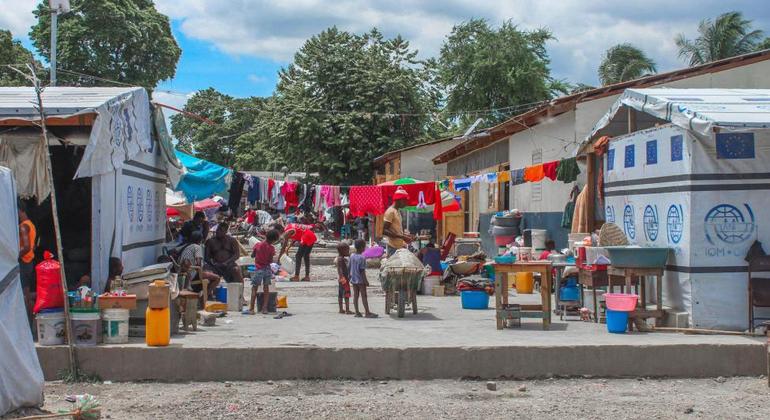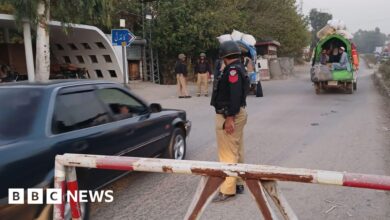Haiti: UN envoy welcomes democratic progress amid alarming violence

Maria Isabel Salvador, Special Representative of the United Nations Secretary-General for Haiti, informed ambassadors in Security Councilhighlights setting of the Transitional Presidential Council in April and swearing-in ceremony of the interim Prime Minister and the new government in June as “clear signs of progress.“
Haiti is embroiled in a complex crisis marked by years of political instability, rampant gang violence, disease outbreaks and a host of dangers exacerbated by climate change.
Across the country, an estimated 5.5 million people are in need of humanitarian assistance, of whom nearly 600,000 are refugees. more than half of them are children – internally displaced and in need of urgent assistance.
Women’s participation
She also praised the transitional government’s efforts to increase the participation of women and other minorities in key government positions, with six out of 18 ministries now headed by women, accounting for 33 percent of the total number of ministries.
“Inclusion and diversity are essential to fostering political transformation This paves the way for restoring state institutions and effectively responding to the needs and expectations of all Haitian people,” she said.
Ms. Salvador, who is also the head of the United Nations Mission in the country (BINUH), welcomed the new Prime Minister’s commitment to fighting corruption and promoting human rights and justice.

Rearrange your priorities
She informed Council members that BINUH is realigning its priorities to support a Haitian-led transition, including credible, inclusive and participatory elections, with the goal of establishing an elected government by February 2026 at the latest.
To that end, she proposed the possibility of enhancing BINUH’s electoral expertise.
She stressed that increasing the participation of women and youth is a fundamental pillar of BINUH’s innovative strategy to support the political process, stating that the focus of this strategy is to promote human rights throughout Haitian society.
Fight against gang violence
On the security front, Ms. Salvador reported that the base for the Multinational Security Assistance (MSS) mission is authorized by the Security Council. resolution 2699 (2023), has been completed. She added that the first group of Kenyan police arrived on June 25 for deployment.
She also welcomed the appointment of a new Director General of the Haitian National Police (HNP), describing it as a “bringing ofNew hope for the ongoing fight against gang violence“ .
The resolution also required the MSS delegation to establish a human rights monitoring mechanism.
As the MSS mission deployed, Ms. Salvador stressed the need to strengthen the human rights sector at BINUH to provide the necessary support.
Look forward
Looking ahead, the Special Representative stressed the importance of establishing coordination mechanisms between national agencies, the MSS mission, the United Nations and other partners in Haiti.
She noted that although the Security Council, in Resolution 2692 passed in 2023, allowing for the expansion of the police force at BINUH, financial constraints and a recruitment freeze have hampered progress in expanding the police force and prisons.
In closing her speech, Ms. Salvador reiterated BINUH’s full commitment to working with the Government and stakeholders towards stability, peace and a brighter future for all men, women, youth and children of Haiti.
Haitians continue to fight for a better future: Interim Prime Minister

Garry Conille, Interim Prime Minister of the Republic of Haiti, addresses the Security Council.
Also at the Security Council, Garry Conille, Interim Prime Minister of Haitistressed that his people “continue to fight for a better future”.
Attending pursuant to rule 37 of the Council’s interim rules of procedure on the participation of non-members, Mr. Conille stressed “There is a need to find lasting solutions to security problems that are being exacerbated by the activities of criminal gangs.“
He called for effective cooperation between national agencies, the MSS mission and BINUH to help restore security and democratic institutions, which he described as a “strategy for the transition”.
Mr. Conille stressed that since his appointment as interim Prime Minister, he has held several working sessions with the Transitional Presidential Council, anti-corruption and accountability organizations, law enforcement agencies, the private sector and diaspora associations.
Calling for solidarity to help Haiti emerge from the crisis that has plagued the country for decades, he stressed that “every day must be used wisely.”
Click here For full coverage of this meeting, see UN Meetings Coverage.




